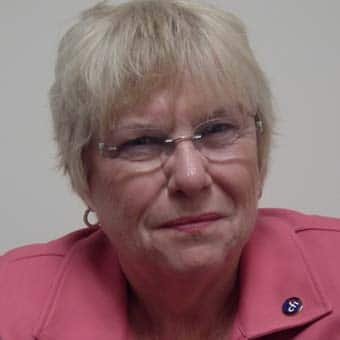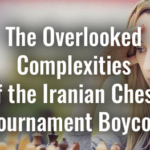Reba Boyd Wooden is Executive Director of Center for Inquiry Indiana. She started The Humanist Friendship Group of Central Indiana in 1999 which became the Center for Inquiry Community of Indiana in 2005. On April 1, 2007, Center for Inquiry Indiana opened on the Indianapolis downtown canal walk at 350 Canal – Walk, Suite A. Reba has a BA from University of Indianapolis with a major in Social Studies Education and a minor in Business Education, an MS from Butler University in History/Education, and an MS in Counselling and Counsellor Education from Indiana University.
Scott Douglas Jacobsen: In brief, what is your family story? What about your personal story?
I was born on September 21, 1940 in Daviess County Indiana to Lester and Opal (Burch) Boyd. I am the oldest of four children. I have two brothers and one sister. Norm Boyd recently retired as a senior vice president of AGO Corporation and lives in Atlanta, GA. Janet Boyd Nowling is a retired teacher from Monroe County School Corporation and lives in Bloomington. Gib Boyd farmed the family land for several years and now is semiretired and is a real estate salesperson. He lives in Martinsville, IN.
My father was a farmer and active in civic affairs. His only elected office was as a county commissioner. He was very active in soil conservation projects such as the Prairie Creek watershed and served on the Indiana state conservation board where he was named Man of the Year one year. My mother was a homemaker and teacher before and after raising her family. We lived with my grandmother, Elfa Bissey Burch, who was also a mother figure to me and had a great influence on my life.
In 1958, I graduated first in my class of 13 from Epsom High School (now consolidated with three other high schools into North Daviess High School). I was very active in 4-H club for ten years at the local and county level. I credit 4-H with developing my leadership skills. I am proud that my son, Jeffery Wooden, is now a member of the Indiana state 4-H board. It is a great organisation.
In the fall of 1958, I came to Indianapolis to attend Indiana Central College (now University of Indianapolis) where I majored in Social Studies education and minored in Business Education. I was secretary of my class my sophomore and senior years and was co-editor of the college yearbook my junior year. I graduated in 1962 and got a job at Mooresville High School because I fit exactly what they needed—a half -time social studies teacher, half- time business teacher, and yearbook sponsor. I earned my MS from Butler University in History and Education in 1968.
In December of 1962, I married Nuel Wooden who at that time was a teacher in Perry Township School Corporation and later taught at University of Indianapolis. We divorced in 1992.
In 1966, I left my teaching job to have a family. My son, Jeffrey Wooden, was born on December 8, 1966. He is now Director of IT Business Services at Eli Lilly Company and has worked at Lilly since his college graduation from University of Indianapolis with a major in Computer Information Systems in 1989. He has two children and two stepchildren. Michael Wooden is a senior at Ball State majoring in Digital Media/Video Production. Taylor Wooden graduated with the class of 2016 from Hamilton Southeastern High School and is freshman at Purdue University in the School of Agriculture. Ben Deo is a sophomore at HSE and Nick Deo is an eighth grader. Ben plays violin in the school orchestra and runs cross country and track. Nick plays percussion in the band. My daughter-in-law, Holly Deo Wooden, is an account executive for Microsoft. She was recently a presenter at the Grace Hopper Celebration of Women in Computing.
My daughter, Cindi Wooden Esquinasi, was born on January 13, 1969. She graduated with an MS in Physical Therapy from University of Indianapolis in 1992 and works as a Physical Therapist doing home health in Seattle, WA. She has three children. Sophia is a freshman in high school this year. She is a ballet dancer and has attended ballet camps in New York City and Portland, OR. Isaac is twelve years old and is on the top soccer team for his age group with Seattle United and was recently accepted into the Seattle Sounders Soccer Academy. Ella is nine years old and also plays soccer and wants to be a politician when she grows up. My son-in-law, David Esquinasi, is also a physical therapist and works in an outpatient clinic for Swedish Hospital.
In 1974, I had the good fortune to be hired as a social studies teacher at Perry Meridian High School where I worked for thirty-one years, retiring in 2005. I taught US History and Psychology for 18 years and team-taught a course in current issues for gifted seniors for five of those years. I was the coordinator of the Challenge Education program for six years which was a program to aid in the integration process with the beginning of court ordered busing of intercity students to our suburban school system. Having earned my MS in Counseling and Counselor Education from Indiana University in 1990, I worked as a guidance counselor at PMHS from 1992 until my retirement in 2005. I have credit for 37 years in public education on teacher retirement.
My children were both competitive swimmers. So, I was a “swim mom.” I was on the board of Indianapolis Swim Club during that time and served as meet director for a few years and as president of the club one year.
In 1999, I founded Humanist Friendship Group of Central Indiana which became Center for Inquiry-Indiana in 2007. CFI-Indiana is the Indiana branch of an international organisation that seeks to foster a secular society based on science, reason, freedom of inquiry and humanist values. I now serve as executive director of the Indiana branch. This branch has grown and has a centre in Indianapolis which provides many services to the people of Indiana, including English as a second language and opportunities for all ages to interact.
I developed and am the director of the Center for Inquiry Secular Celebrant program which certifies celebrants to perform marriages and memorial services. I was the lead plaintiff in a successful lawsuit for the right of secular people to solemnise marriages in Indiana
I have worked for LGBT rights and networked with those groups. Since their right to marry was upheld by the courts and I as a Secular Celebrant became legal to solemnise marriages in Indiana, I have solemnised a number of same sex marriages including the first same sex marriage solemnised by a Secular Celebrant. I am president of Health, Access and Privacy Alliance (HAPA), an alliance made up of several not-for-profit organisations, including Muncie League of Women Voters and AAUW, working to improve access to healthcare and protect reproductive choice in Indiana. I chair the meetings and do advocacy work with the legislature.
I have been a member of the ACLU of Indiana Board of Directors for ten years and have participated in bringing information to school age children on Constitution Day.
I am an avid reader. I read mostly nonfiction—biographies, history and political science related topics. I enjoy doing the advocacy work to make this a better world and the many interesting people I have met through CFI, ACLU, and other organisations. I work out with a personal trainer two mornings a week and try to stay healthy. I have hiked over 8,000 miles with Indianapolis Hiking Club in the past and try to do some walking on my own now but don’t have time to make many of the official hikes. I have been a season ticket holder at Indiana Repertory Theatre for several years and enjoy the plays there.
You earned a BA (Social Studies Education and Business Education) from the University of Indianapolis and an MS (History/Education) from Butler University, and an MS (Counselling and Counsellor Education) from Indiana University. What were the main lessons and perspectives about the world gained from those academic qualifications?
My major history professor at University of Indianapolis, Dr. St. Clair was a great influence in exposing me to an in-depth view of history which widened my world view and started me on the road to progressive thought.
After 37 years in public education, you retired in 2005. What were some of the most memorable experiences that come to mind in that time?
The weekend retreat to Bradford Woods for the Challenge Education program was designed to aid in the desegregation process initiated by court ordered busing of students from Indianapolis Public Schools to Perry Meridian High School. When I was asked to participate in the fall of 1985, I was so impressed with the program that I volunteered to be in charge of the program.
I developed a selection process by which students could apply and then I made the selections. Many more students applied each year than I could take to the retreat. I made selections to keep an equal balance of male/female, 9/10/11/12 grades, IPS students/Perry Township students. After I made the selections, I divided them into groups also keeping the same balance. Once we arrived at Bradford Woods, Indiana University students took charge of the activities. I also asked for volunteer faculty members and assigned one or two faculty members to each group.
During the weekend, participants did team building activities such as the trust fall, ropes course, the wall, the DMZ, the amoeba, a night hike, and group discussions. Through these activities, students who might not have interacted at school became acquainted and formed friendships. Each group also developed a skit to perform in front of the entire retreat.
Some memorable moments included when an IPS student remarked on a night hike that he didn’t know there were so many stars in the sky, when Isaac Booth was a small 9th grader and we used him to do the difficult moves on the DMZ activity (Isaac went on to play college football), and when Bob Dunn and Ron Bolyard sang “Baby Face” to each other in a skit.
It was sometimes a challenge to get faculty members to give up a weekend to go on this retreat but I think that once they went, they were glad that they did. My most faithful adult volunteers were Sheri Austin, Gloria Sam, Betty Kohls, Ken Knabel, and Greg Robinson.
Greg Waltz, Eric Cox, and others have told me in later years how glad they were that as students they were selected to attend and it was one of the highlights of their high school days. One student whom I would especially expect to say this today is Joe Palmer. Joe was a student in one of my classes and he wanted to go to Bradford Woods in the worst way and kept asking me if he could go. However, Joe was not the most well behaved student in school and had spent time in the dean’s office and Mr. Head always went over my final list and took students off who had behaviour problems. However, I went ahead and put Joe on my list. Sure enough Mr. Head called me into his office and said, “Mrs. Wooden, you can’t take Joe Palmer to Bradford Woods.” I told him that Joe really, really wanted to go and that if he would let me take him that I would be personally responsible for him. So, Mr. Head relented on that condition. The next time I saw Joe he asked me if Mr. Head had said he could go or not. So, I told him that yes Mr. Head had said he could go but that I was personally responsible for him and if he caused a problem that I would be in trouble. Joe said that he would be good and he was. He came up to me several times during the weekend and asked me how he was doing and of course he was doing fine. This weekend probably meant more to Joe than anything he did in high school. Don’t know where he is today. I hope he is doing fine. I would bet he would mention his Bradford Woods experience.
I would like to thank Mr. Head for being so supportive of this program, all of the faculty members who sacrificed their weekends to make this program possible, and all of the great students who made this such a rich experience.
You are the Executive Director of the Center for Inquiry Indiana. What tasks and responsibilities come with this position?
I organise social and educational events and do advocacy work on issues involving separation of church and state and promoting public policy based on the scientific outlook on life
Do you consider yourself a progressive?
Yes.
Does progressivism logically imply other beliefs, or tend to or even not at all?
See Affirmations of Humanism here:
How did you come to adopt a socially progressive worldview?
From being a history major, reading history, observing life.
Why do you think that adopting a social progressive outlook is important?
It promotes more opportunity for more people.
As a progressive, what do you think is the best socio-political position to adopt in the America?
Secular Humanism. I am not committed to one political party and grew up with a father who was active in the Republican party. However, in today’s politics, the Democrat party represents my world view in most cases.
What big obstacles (if at all) do you see social-progressive movements facing at the moment?
Lack of scientific literacy in the general population. Anti-intellectualism, biased media which spreads fear and unfounded claims.
How important do you think social movements are?
Very important. That is how change happens
What are your religious/irreligious and ethical beliefs?
Secular Humanism
Do atheists and secular humanists experience bigotry and prejudice at all levels of American society?
Yes. I think it is changing for the better at some levels as more people leave religion but it is still there.
If so, why?
Lack of understanding of Secular Humanism. Religious indoctrination.
Who is a living women’s rights activist that impresses you?
Hillary Clinton
Who are other personal heroes throughout history?
Eleanor Roosevelt. Ruth Bader Ginsburg. Madeline Albright.
What is your favourite scientific discovery ever?
The birth control pill.
Thank you for your time, Reba.







Article Discussion